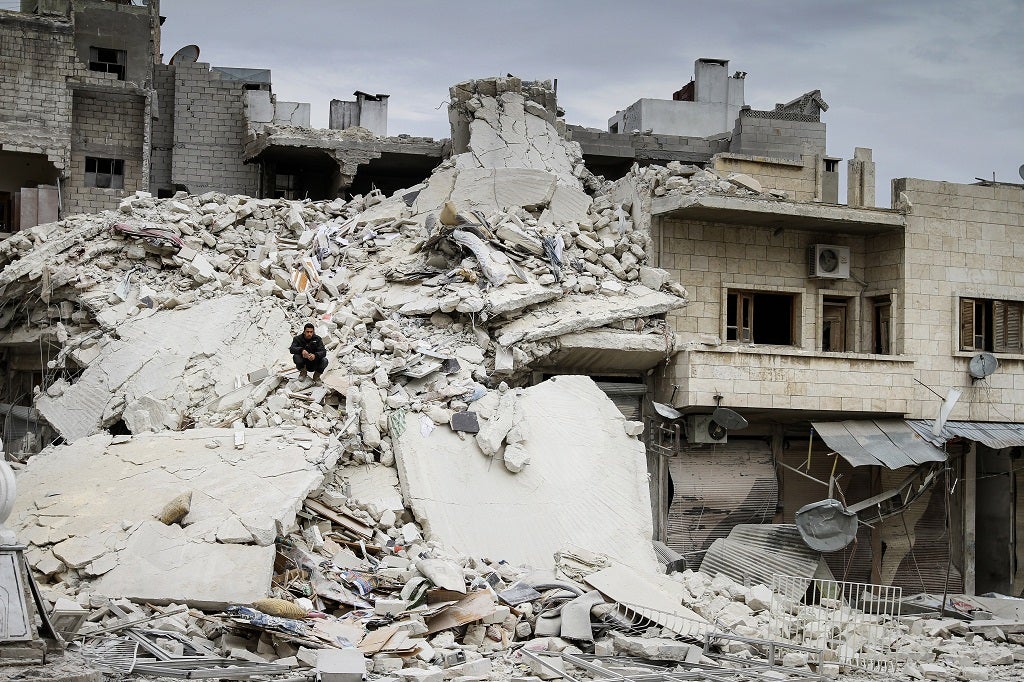International Humanitarian Law must be bolstered to prevent the killing of more innocent civilians
From Iraq to Sri Lanka, there's too little legal accountability for massacres

Lakhdar Brahimi, the UN’s Peace Envoy, warned on the cusp of the year that 100,000 more lives could be lost in Syria in 2013. His grim prediction, even if considered extreme, is a sobering reminder of just how utterly catastrophic the civil war in the Arab Republic is fast becoming.
His statement came after reports of a massacre near a University, the latest probable atrocity among a flood of others last month. It followed air strikes on refugee camps and people queuing for food, in addition to the shelling of a group of school children near Damascus; the latter incident barely making a dent in the news here, presumably because such bloody moments have become too familiar to elicit appropriate shock.
Given the horrors occurring in the Levant, it is apposite to ask why conflicts of this kind, in which the majority of victims are civilians, have become standard fare (see: Iraq, Sri Lanka, Chechnya, Sudan and many others in recent years alone).
The answers that present themselves are deeply ugly. In my view, central to most possible explanations is the sad but evident reality that many states - including those that possess the all-important power of veto at the UN Security Council - simply do not value the laws of war over their strategic interests. Additionally, recourse to expedient criminal acts in wartime is encouraged by the fact that International Humanitarian Law (IHL) - which governs the conduct of parties to conflict - remains painfully difficult to enforce.
Culprits
One does not have to look far for examples that support this view. Even as people are being tortured and executed by the rebels or blown to pieces from the air by Assad’s butchers, Moscow and Beijing have continued to effectively stymie efforts to bring the situation in Syria before the Chief Prosecutor of the International Criminal Court (ICC). Attempts at the UN Security Council (UNSC) to enforce sanctions against Assad have likewise been blocked by these two veto-wielding powers. Rather than condemn the crimes of their long-time allies in Damascus, Russia has sold weapons to them.
The United States and Britain have criticised such displays of abject cynicism, and rightly so. The Russians argue they have no intention of tearing up contracts made before the outbreak of violence in Syria. But all the pious talk in the world will not efface from history the fact that western powers have acted to protect themselves, and their allies, from accountability with the same disregard for justice or international law when it has suited them.
Many more violations of IHL probably occurred in Fallujah during the Iraq war than will ever be acknowledged let alone seriously investigated by Washington or London, rather like the causes of the horrendous birth defects in children that emerged after coalition assaults on the city. A veteran whom I interviewed told me he saw US tanks flatten “an entire neighborhood, one house after another, without checking to see if anyone was inside” among other shocking incidents during the final US-UK assault on “the City of Mosques”. His testimony augments damning reports in the media, as well as from human rights organisations and the International Red Cross who complained bitterly of the “utter contempt for humanity” shown by both sides as the battle raged. No high-level convictions for the credibly alleged abuses in Fallujah have occurred to date.
Whatever the reasons for such injustices, it is both unconscionable and dangerous that things should continue as they are. When war crimes are followed by impunity anywhere - particularly when the unpunished offences are abetted or perpetrated by great states - the authority of international law is eroded. This consequently cripples IHL’s capacity to deter atrocities against defenceless civilians.
Watershed
In order for these trends to be reversed a great shift in the norms of IHL enforcement will have to occur. At present, the global justice system is relatively “toothless”, given that the International Criminal Court can only pursue suspects with considerable state co-operation, short of being empowered by UNSC resolutions. Serious obstruction from host governments and opposition from regional or global hegemons usually mean that important investigations cannot, in practice, take place.
The ICC itself is strictly considered a “court of last resort” and only a back-up to internal accountability mechanisms. War crime suspects are meant to, initially at least, face judgment in domestic courts - a fact that poses obvious problems given that the judiciary in most nations are rarely impervious to political pressure and have a tendency to punish lower-status offenders more readily than Generals or Ministers.
Fortunately there are some prospects for change on the horizon. In the future it is conceivable that progressive nations will follow the lead of Germany and Switzerland in beginning proceedings against supposedly untouchable foreign criminals for major international offences that prompt the exercise of universal jurisdiction. The successful arrest and trial of a powerful fugitive from justice anywhere would be a major coup for the cause of human rights, setting precedents that could have significant legal ramifications and encourage more of the same.
But until such a watershed moment, or something similar, comes to pass one can expect to see wrenching injustice continue to compound the cruelty of war - prospects that no-one should be comfortable with, least of all those in the halls of power who shamefully acquiesce to the status quo.
Join our commenting forum
Join thought-provoking conversations, follow other Independent readers and see their replies
Comments
Bookmark popover
Removed from bookmarks